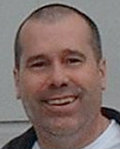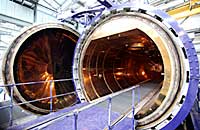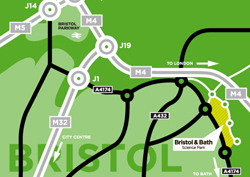RSSEvents
ON THIS PAGE...
24 September 2013
Role of lasers in composite manufacture and processing
- Sector: Laser Processing
- Location: National Composites Centre, Bristol, BS16 7FS
- Attendees: All Welcome
![]()
![]()
![]()


About this workshop
The interest in composites has grown greatly over the past decade. Their unique properties (high strength to weight ratio, corrosion resistance etc.) offer increasingly important advantages in manufacturing; but they can present a major challenge to cutting, drilling and other forms of material processing.Lasers offer a unique solution, which has been recognised especially by the aerospace sector. As a result, lasers are finding a growing number of industrial applications, and developments in both laser and material technologies have recently led to a further expansion in this area.
This workshop provides a broad overview of the current status of both laser technology and composite processing, with presentations from industrial users, researchers and laser manufacturers. Specific themes include: laser processing of polymer composites within the aerospace industry; laser surface texturing of composites prior to adhesive bonding, laser sintering of PEEK for aerospace and biomedical applications; laser welding of thermoplastics; current state of the art in lasers for composite processing.
Paul French Workshop Chair
 Paul French started his laser material processing career at University of Liverpool, where he received a PhD from Professor Steen’s laser group in 2001. At the Lairdside Laser Engineering Centre Paul worked on a number of industrial laser processing projects. In 2008 Paul and Martin Sharp were invited to set up a research group within the General Engineering Research Institute (GERI) based at Liverpool John Moores University. The group ”Photonics in Engineering (PiE)” continues to work with industry on different applications in a number of industrial sectors including aerospace, automotive, defence and biomedical; the development of laser material processing of
Paul French started his laser material processing career at University of Liverpool, where he received a PhD from Professor Steen’s laser group in 2001. At the Lairdside Laser Engineering Centre Paul worked on a number of industrial laser processing projects. In 2008 Paul and Martin Sharp were invited to set up a research group within the General Engineering Research Institute (GERI) based at Liverpool John Moores University. The group ”Photonics in Engineering (PiE)” continues to work with industry on different applications in a number of industrial sectors including aerospace, automotive, defence and biomedical; the development of laser material processing of
composites is of special interest.
Who should attend?
The workshop is valuable to anyone with an interest in laser material processing who wants to understand where this technology sits in relation to composite materials. The wide scope of this event means that there is something for everyone in the laser user and supplier community, from beginners to experts. Manufacturers and industrialists, supply companies, laser users, laser source manufacturers and suppliers, laser-based engineering subcontractors and machine integrators - all will benefit from gaining a greater appreciation of the current state of play and the resultant opportunities for applying this technology within their sector and the future development of a laser-composite supply chain within the UK. The workshop nature of the meeting offers many opportunities for delegates to discover the interests and concerns of others in the laser composite-processing community and to establish valuable links.
Download a flyer (pdf 344KB)
Programme
08:15 REGISTRATION and refreshments
09:10 Welcome by Paul French
Paul French - Liverpool John Moores University
09:20 Introduction to NCC
Paul Gallen - National Composites Centre
09:40 KEYNOTE
Laser transmission welding of high-performance thermoplastics
Peter Jaeschke - Laser Zentrum Hanover
10:10 Exploitation of laser processing in UK industry
Mike Green - AILU
10:30 Refreshment Break
11:00 KEYNOTE
CO2 laser ablation of damaged CFRP: A GKN Perspective
Paul Saunders - GKN
11:30 Precision machining of composite materials with Picosecond lasers
Mark Thompson - Coherent
11:50 LUNCH and EXHIBITION
12:50 KEYNOTE
Remote laser processing of fiber reinforced polymers - perspectives for industrial use
Annett Klotzbach - Fraunhofer IWS Dresden
13:20 Process rate and quality estimation tools for laser processing of fibre reinforced polymers
Goncalo Pardal - Cranfield University
13:40 Lasers in Composites Aerospace Industry
Gary Taylor - GUDEL
14:00 Refreshment Break
14:20 High Temperature Polymer Development on the EOSINT P800
Stuart Jackson - EOS
14:40 Particulate and gas phase fume produced during laser processing of CFRP
Matthew Leach - University of Hull
15:00 A study of the effect of laser surface processing on bond adhesion for carbon fibre composites
Peter Dickinson - Spectrum Technologies
16:05 End of workshop
15:20 NCC Tour (45 mins)
The venue
This workshop also provides an ideal opportunity to visit the National Composite Centre. The NCC is owned by the University of Bristol and work on building the centre started in August 2010. The set-up of the NCC was a £25m investment supported by the European Regional Development Fund, the South West Regional Development Agency and the Department of Business, Innovation and Skills. Five founding members of the NCC; Airbus, GKN Aerospace, RR, Agusta Westland and Vestas have signed a long term partnership with the NCC. The NCC one of the centres that form the High Value Manufacturing Catapult.NB: As a new road and postcode, the MCC may not appear on your map or satnav. If you are using GoogleMaps or SatNav, please use postcode BS16 7AJ to get to the roundabout at the entrance to the Bristol & Bath Science Park, before following the road around rightwards, up Feynman Way, to the National Composites Centre. - See more here.
TOUR
NCC Capabilities Tour - Highlights Design & Analysis Teams
Extensive 3D CAD Design and analysis capabilities include CATIA, NASTRAN, Fibersim and Hyperworks.
 Tri-Robot Flexible Manufacturing Cell
Tri-Robot Flexible Manufacturing Cell
- We are currently installing a flexible manufacturing cell that will allow 3 robots to work together to manipulate, fabricate and machine large components
- 2 KUKA KR270-2 robots on a fully covered slide
- 1 KUKA KR240-2 robot mounted on fully covered slide.
- Fully flexible cell for composite ply deposition, pick and place, trimming, ablation, fixture manipulation and end effector development
- Auto end effector change tool stand
- Cell working envelope of 10m x 2m x 2m
Automated Fibre Placement
The NCC has a robotised automated fibre placement cell working to optimise parameters for placement of multiple fibres
- Clean Room – Twin Corolis AFP mounted on Kuka robots
- Single & Twin-robot Automated Fibre Placement (thermoset & thermoplastic heads)
Through Thickness reinforcing equipment
The centre has a through thickness reinforcement cell where delamination risks to components undergoing out of plane loads can be reduced by additional reinforcement in the Z plane.
- KSL/Boyer head mounted on 5 axis Kuka robot
- Z pinning and stitching ability
Liquid Resin Cell
- RTM
- RTM Lite

Autoclaves – AIC
The NCC has excellent high temperature and pressure autoclave facilities suitable for thermoset and thermoplastic composites.
- Large, thermoplastic capable
- 3m x 10m (400C/14 BAR maximum)
- Smaller 1.5 x 3m autoclave
Dry Forming Cell
We have excellent facilities for working with preg-impregnated materials including:
- CNC automated Ply Cutter – (Topcut Bullmer Premiumcut CV) 1.8m x 3m maximum cut size
- Diaphragm former – Aeroform – 1.4m x 12m capacity
- Hand layup tables with vacuum consolidation
Machining
- Metalworking and composites machining workshop
- 5 axis CNC controlled machining centre (mTorres) with 10m x 3m bed size and flexible Z support product supports
- Water Jet cutter (Flow) – 1.3m x 1.3m x 0.2m capability
Materials Laboratory
- Differential Scanning Calorimetry and Thermogravimetric Analysis to measure phase transitions and compositions of materials.
- Thermal characterisation & Dilatometry
- Scanning Electron & Optical Microscopy
- Instron Material Properties Tester – Flexural, tensile, fatigue and cyclic testing of samples
Non Destructive Testing
- intelligeNDT ISQUS Automatic Ultrasonic Inspection Gantry Machine with 9 axes. 15m x 4m x 1.6m and it is capable of scanning complex 3D surfaces (within the limitations of a gantry system). Produces Amplitude and Time-of-Flight C-Scans.
- Olympus Omniscan MX2 with 36” x 36” Glider Scanner. Time-of-Flight C-Scans in Phased-Array and Single Element Pulse-Echo modes.
- Nikon Micro-Focus CT Scanner.
- Nikon/Renishaw High Speed Bridge Coordinate Measuring Machine, 2m bridge, 4m length, 1.5m high working envelope
Registration Fees
* AILU and supporting organisation members: GBP 140 plus VAT
* Non members: GBP 180 plus VAT
* Concessions: GBP 60 plus VAT (retired, unemployed); GBP 40 plus VAT (full time students)
* Exhibitor (AILU and supporting orgiansation member): GBP 140 plus VAT
* Exhibitor (non-member): GBP 180 plus VAT
* Exhibitor/delegate discount: GBP 50 plus VAT
Fee includes a delegate pack.
Cancellations will be accepted up to 1 week before the event; otherwise the full fee may be charged.
To register for this event please contact the AILU office by phone or email (T: 01235 539595; E: events@ailu.org.uk. Reg-on-line registration has now closed. Please note that we cannot accept more requests to go on the tour.
| Please note: Delegates are required to register by 18th September latest and to bring photographic identifaction with them on the day. Also when registering please state your nationality (requirements of the NCC) |
Travel

Bristol & Bath Science Park, Emersons Green, Bristol, South Gloucestershire BS16 7FS
NB: As a new road and postcode,the NCC may not appear on your map or satnav. If you are using GoogleMaps or SatNav, please use postcode BS16 7AJ to get to the roundabout at the entrance to the Bristol & Bath Science Park, before following the road around rightwards, up Feynman Way, to the National Composites Centre.
Parking instructions
As you enter Bristol & Bath Science Park, follow the road around rightwards, up Feynman Way. Just past the 20 mph speed limit sign turn immediately right onto Dirac Crescent. You will pass the main science park building on your right. The gravel overflow car park is located immediately to the left of the main car park. Please ensure that you are parking in the gravel overflow car park and not in the main car park. Parking Marshalls in yellow jackets will be on hand to guide you.
Please note: The NCC is a short walk from the car park (the building opposite the entrance to the car park is not the NCC). Exit the car park at the top (the opposite side from where you entered). The building in front of you is the NCC. Cross the road in front of you and carry along left towards Feynman Way. The entrance to the NCC is on your right.
Accommodation
Details of accommodation with links to sites with full descriptions can be found below.
Holiday Inn Bristol City Centre – BS1 3LE
Premier Inn Bristol Filton – BS34 7BR
Travelogde Bristol Central Hotel – BS1 5TT
The Coach House – BS16 1RY
Grey House Bed and Breakfast – BS34 6AL

